October 11, 2016
Aviv Magazine: Reviving German/Hebrew Linguistic Legacies
Lila Nazemian
“Without translation, we would be living in provinces bordering on silence.” — George Steiner
Languages are more than just a means to communicate with words, bearing rigid grammatical rules and irrational spelling policies. Languages have specific sets of sayings, dialects attributed to certain groups of people, and above all, they bear markers of identity, tradition, religion and, of course, history. When languages come face to face with one another, all these markers come into contact through acts of translation.
While certain languages have much in common – such as Italian and Spanish, considered to be hot blooded cousins – some languages, like Arabic and Persian, have contentious relationships. (Try telling an Iranian they speak Arabic.) And others still, have loaded histories, say for example, German and Hebrew. (Need I elaborate? yes.)
When putting German and Hebrew through the filter of history, there is the undeniably devastating relationship between their populations that would still deter some Jews from most things German. But there is more to this history than the horrors of the Holocaust; Yiddish, the language spoken by Ashkenazi Jews throughout Europe for centuries, is a combination of mainly medieval German with some classical Hebrew vocabulary and other variant local lexicons from Slavic countries where Jews resided. However after the Nazi massacres, Yiddish was not to become the national language of the controversially created Israeli state in 1948. Instead Hebrew, a barely formed yet modernized version of its scriptural forefather, spearheaded in the late 19th century by Eliezer Ben-Yehuda, became a pillar for the new Jewish state and was systematically developed, codified and taught to new generations of Israelis. It is important to mention however, that before the formation of the Israeli state, a plethora of German words entered the Hebrew language thanks to the waves of German Jewish settlers in Palestine (still under British colonial mandate) in the 1930s.
Aviv is a newly launched bi-lingual magazine of art and culture based out of Berlin that, in their own words, aims to “renew the relationship between the Hebrew and German language and culture.” Founded by Hanno Hauenstein, who acts as an editor, a translator and a writer for the magazine, Aviv is also part art project. With its thick matte paper, milk-drenched color images, and confrontational design with barely any margins and no white pages, the magazine uses art and design as tools for translation. The left cover begins with German texts which meet their Hebrew counterparts in the middle of the magazine through an elaborate photo-shoot of floral-crowned men—naturally the Hebrew version starts from the right cover. What with a sprinkling of Munich and New York, the writers of this first issue primarily hail from the Berlin-Tel Aviv poles.
A few weeks ago, I Skyped from New York with Berlin-based Hanno Hauenstein to discuss the launch and significance of Aviv, where he touched upon the influx of young Israelis to Berlin, the changing linguistic landscape in Germany following the integration of thousands of refugees and the reception of the magazine in such a climate both in Germany and in Israel.
Lila Nazemian: Hi Hanno. So as a German, how did you decide to learn Hebrew?
Hanno Hauenstein: Well I began learning Hebrew when I was in Tel Aviv, and it happened more by mistake because I wasn’t planning to stay in Tel Aviv as long as I did. I was supposed to stay for two months as a researcher at the Minerva Institute at Tel Aviv University. And then there were the social justice protests happening in the wake of the Arab Spring in 2011. There were huge weekly demonstrations with tent-cities; the Israeli left wanted to address not only security, but also the rising cost of living, the deterioration of social services and migrant related issues. I decided that I would write about it as a journalist and so I prolonged my stay, until I slowly picked up and mastered Hebrew.
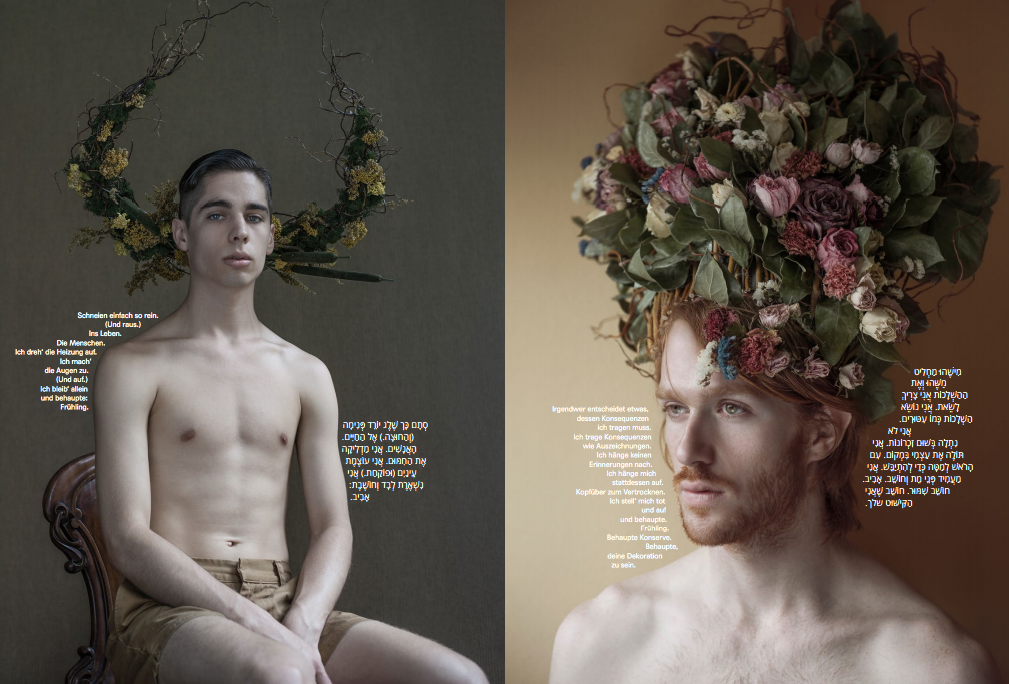
LN: When did you begin translating Hebrew to German?
HH: The first thing I translated from Hebrew to German were articles by Gershom Sholem that were published in Haaretz, which was something I did around 2014, roughly three years after I went to Israel for the first time. But most of the translation work that I have done has evolved with the magazine. Translating Hebrew texts from the 50s is near impossible since it is a relatively young language, Hebrew changed quite radically over the last decades. Translating literature – like texts by Etgar Keret or Nir Baram – is more natural and ultimately more fun for me to do.
LN: When did this transition into the idea to start Aviv Magazine?
HH: I have wanted to make a print magazine for a while since I have noticed that my level of awareness when I read online is decreasing parallel to the amount of tabs that are opening up. It was an organic process to do something with German and Hebrew, because I knew those languages and I was working with them for a long time. But I think that the idea of the immersion came from when I worked in Jaffa, in Israel, at an Arabic-French-English TV channel called i-24 news. I was there as a reporter and I was writing different features and I felt that it was such a fascinating process. For example I was writing in English about things that were happening in Germany, like the Neo-Nazis that were gaining influence or the discussions taking place in Germany about banning the Burqa, and it was so interesting to see how the content is influenced by the format. How it changes in such a dynamic way when you translate it into a different language and make it accessible to different readership. If I would write from a German perspective in English about the discussions about the Burqa ban, which is then translated to Arabic for Palestinians, it’s an interesting interference that is taking place.
LN: I initially thought that there is little linguistic correlation between Hebrew and German, which turned out to be wrong of course. Instead, I immediately thought about the particular historical correlation between them, more like a very deep cultural and religious disassociation…
HH: Of course, it’s a very catchy theme to start with. Yes, there is a strong correlation between those languages, it’s also a bit of a “Renaissance” idea, since there was a Hebrew publishing culture in Germany around the 20s before the Nazis and—
LN: There was?
HH: Yes, it was not major, but there was a big Jewish tradition in Germany especially in the beginning of the 20th century, both secular and religious, to which Berlin clearly was a center. And there was a publishing culture connected to it, in some circles Hebrew was even a spoken language at that time. Later this culture was erased of course.
In Israel, what has been founded as Hebrew is something a bit different. There definitely is a sort of Renaissance happening in Berlin now, a Hebrew language culture that doesn’t immediately identify with Israel as the center of Hebrew, but sees Hebrew culture as something viral and re-emerging in a different way—besides the Zionist sensibility of Hebrew and the land so to speak.
LN: So there is a Renaissance of the language in Germany, separate from Israel?
HH: Yes, well there is a bigger influence. Germany these days is obviously much more influenced by Arabic than Hebrew for example. So it happens on a relatively small scale, but it does happen.
LN: Where does this influence come from? Is it from native Germans, or is it from an influx of Israeli expats that are now living in Germany?
HH: The latter. There are hardly any Germans who know Hebrew, it’s mostly Israelis who come for different reasons. Many don’t identify with the politics anymore, that’s a large part of the people who are leaving Israel. I feel like in Israel the political situation has come to a point where the liberal elite is also affected by it, it’s no longer only Palestinians who suffer. But obviously that liberal elite has the privilege to leave. I’m of course talking about this in very simple terms, it seems as if many people are realizing that something is going crucially wrong, and be it for reasons of security or for political conviction, they are leaving to other places, to America, to Europe… Many people are coming to Berlin because Berlin these days is especially attractive to people who feel alternative or different.
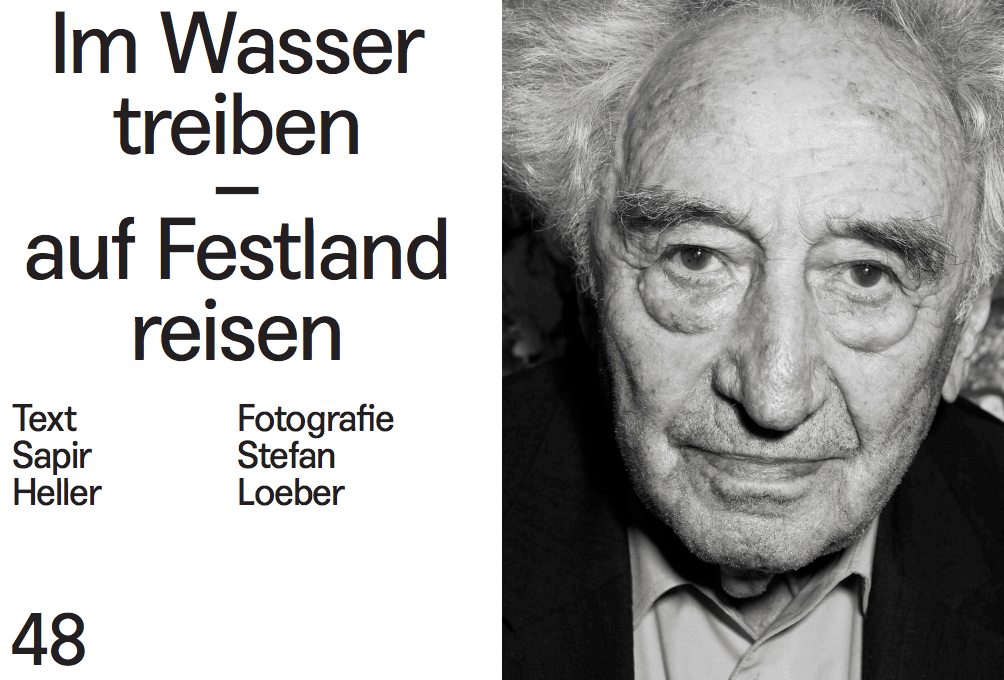
LN: It seems that in the past ten years there is a much stronger presence.
HH: Absolutely, most of the Israelis that live in Berlin now came in the last five to ten years. It’s an odd situation and you can hardly research the numbers because in Israel there is a very strong ideology that sees Jewish people moving to Israel as “ascending” to a higher place, known as “Aliya.” But leaving the country is called “Yerida,” which is to descend. There is strong inner-cultural judgment in Israel on people who leave the country, and it’s difficult to get specific demographic numbers on this.
LN: Because they are also probably not open to talking about it.
HH: Exactly, so it’s not really clear how many people live here, but it’s about thirty thousand.
LN: I remember when we were in Berlin a few years ago, one of your Israeli friends was talking about the shocked reaction of his family with his decision to move to Germany. I would assume this is a common reaction of many families. So, why Germany, given the history of Jews in the country?
HH: I do believe that in this generation – my generation – the history between Israel and Germany is more like a “sexy footnote,” as in, it’s no longer a substantial inner conflict that people have. Maybe if Israelis come here for the first time, when they go on a train, they feel emotional and they hear German words that they are familiar with from their school education. But in the end, for people who have the privilege to travel here, Berlin is not really Germany. It’s a city where you have affordable living and many vibrant cultural activities taking place. I feel that this is what is attractive for the young people that move here, they are looking for that culture.
Of course there are people who say that it represents a conflict, and it is ultimately also a sort of provocation that if you leave Israel for Berlin, that you prove to your parents and grandparents that you don’t really care. It’s hard to generalize these stories, because it’s always personal. There are so many stories of other people though, for example of Arab Jews, who don’t have any of these issues in their families, who come from places like Iraq or Syria. In that sense, they have nothing to do with the Holocaust and they have a totally different experience. There are stories of people who come here and they suddenly feel like they can communicate with other people from the Middle East who are not Israelis and whom they feel a connection to. That’s a totally different layer of experience.
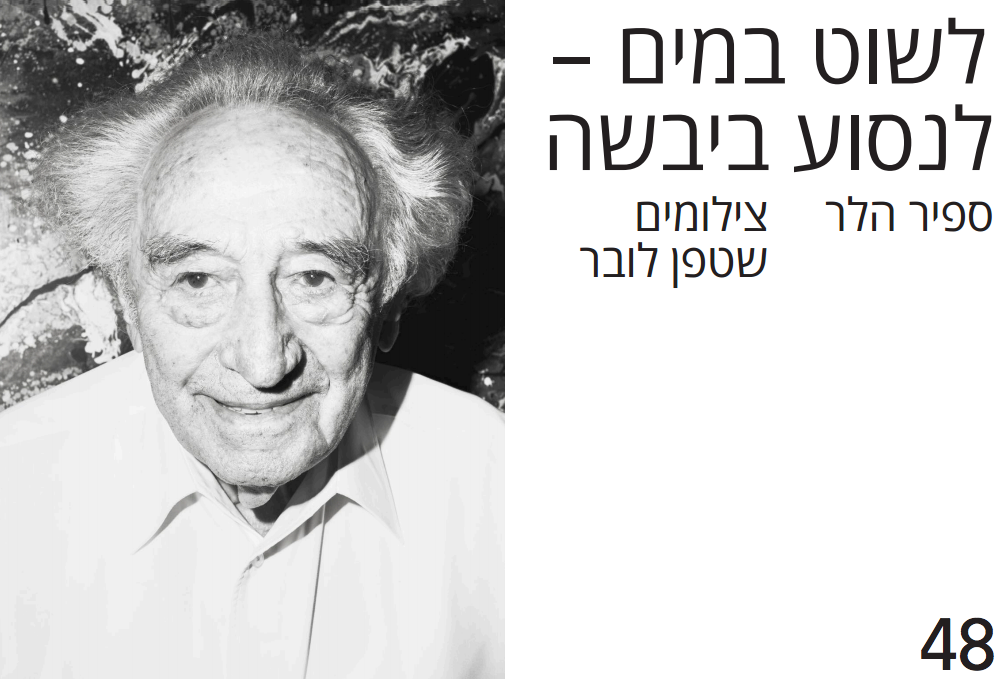
LN: Yes, that’s such an important point, and it’s so little talked about. Middle Eastern Jews, Arab, Iranian, Turkish and African Jews are often an afterthought.
HH: Yes, Mizrahi Jews in Israel are anyway a big topic at the moment, especially politically, because they have been discriminated against in Israel for decades…economically, socially, demographically. I see strong similarities with Turkish people in Germany who are Germans, but second, third or even fourth generation German Turks. There are so many similarities between their experiences in society. Few actually talk about these things, but such topics of cultural encounters interest me much more than the often talked about and evoked “normality” between Israelis and Germans, which is also something the Magazine did not want to fall into.
LN: How did the launches in Berlin and Tel Aviv differ?
HH: The reception was a surprise to me, because I saw a lot of people for the first time. There were especially many people from the arts who were interested in such a venture.
The launch in Tel Aviv was a bit crazy. I got off the place and immediately was supposed to have an interview but, for the first time in years, they stopped me at the airport! It was very awkward, I was stuck there in the questioning room for over an hour and right afterwards I had the interview for Israeli TV, then another for SPIEGEL. But the launch finally happened and it worked out in the end.
LN: So you were on Israeli TV, what was the reaction in Israel?
HH: I think in Israel it was received very differently than in Germany. In Berlin, the catch of the whole project is the language: people hear “Hebrew” and they associate it with Judaism. But in Israel, the format itself is crazy, people don’t understand why you would do a print magazine. There is no market or scene for that really. In Berlin and other major European or American cities, you have the big magazine stores, but in Tel Aviv you don’t really have that. You have magazines but they are more like zines, in the classical punk rock sense, which are distributed for free by literaries who can afford to do that for free. But it not so much a professional endeavor and it’s not graphically refined. So the magazine as an object was interesting for people who asked: “Is this a book or what is it? This is weird.”
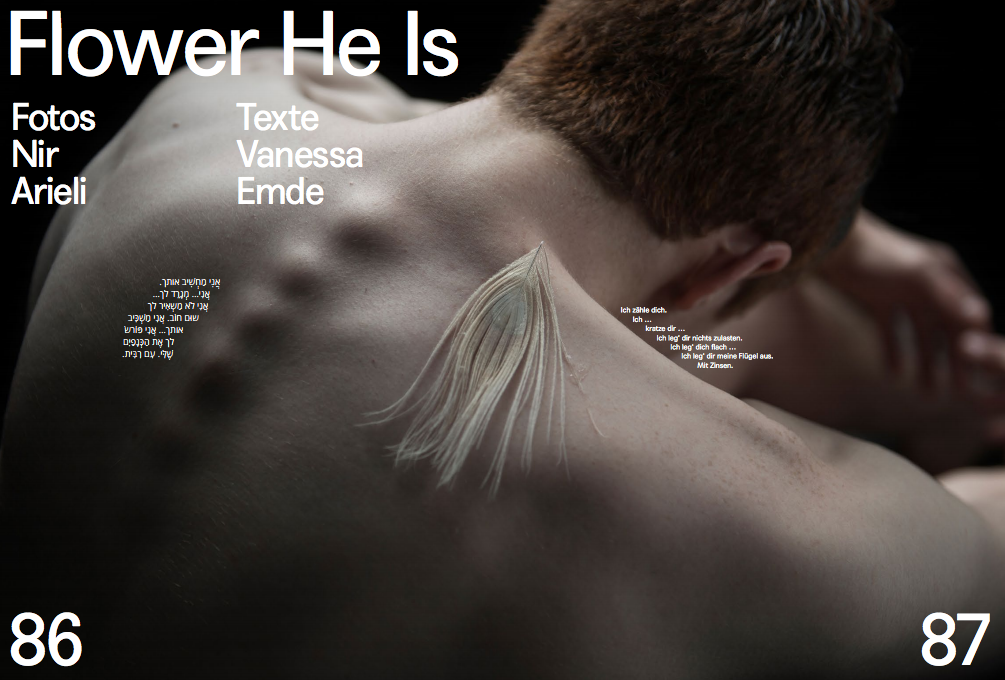
LN: What are you planning for the second issue? Do you think you’ll ever expand the languages?
HH: Because a major part of the readership is based on this Hebrew-German connection, I think for now this will stay part of the second issue as well. I also have a big pool of translators, people who are very good at working with those languages and wouldn’t want to start from scratch.
But, at the moment I am planning to do something with Open Society, a group that just formed in Berlin that is an offshoot of the famous American Foundation of the same name. We want to collaborate with regards to the rise of the right wing in Germany—as it is happening everywhere in the world. The elections here are one year after the American ones, and the Berlin Open Society have decided to do one event/project daily until the elections take place. So I am thinking about collaborating with them on a possible addition to Aviv in Hebrew and Arabic as my contribution to Open Society. Because obviously after close to a million refugees have arrived here from Syria and North Africa, who are mostly Arabic speakers, it’s clearly an important issue. And it’s not yet clear if we will do one issue of Aviv in Arabic and German, or if we will insert it into the second issue as a bridge between those languages. Because of course, Arabic is one of the national languages in Israel, 1/5th of the population within Israel, not even speaking about Palestine, is Arabic speaking.
LN: Palestinians with Israeli citizenship you mean?
HH: Exactly, that’s the 1/5th. And then you have the other half of the country. But it seems like a logical step to go to Arabic, I don’t as yet know how exactly but I think we will work it into the second issue somehow. For example, and this is not official yet, but we have been thinking about the cover of the next issue. There is this band called A-WA, they are Israeli Yemenites. And there is this Palestinian photographer who was interested in the idea of photographing them. It plays with the issue of cultural appropriation, but also recreating a kind of tradition. So I thought about the photo-shoot, and including the Arabic lyrics on the images, to expose it. The photographer would shoot this from her perspective, it would be very colorful and feminine.
In that sense, it would be a very good aesthetic contrast to the first issue, which was very gay, blue-toned, cold and young. So visually and aesthetically I want the second issue to be very different.
LN: A lot of people forget, or chose to forget, how diverse Israel is and how many layers of different people and cultures inhabit the small land, even if segregated. Do you the new generations are weakening the idea of a supposedly homogenous culture?
HH: Yes, I totally agree. This weakening of the culture, it is happening. Israeli culture is politically enforced right now and the government was recently trying to remove Arabic from being a second national language. That’s just sad. If you go to Tel Aviv now, you will see the street names in Hebrew, Arabic and English, and so it would be a major change even to just amend the signs! If you would delete Arabic from the public sphere, make it even more invisible, that would be a shame. I think language can be a tool to show diversity to create visibility.
There are a lot of critical ways to think about the magazine. A lot of people have told me that we are trying to make something beautiful out of something that is not actually beautiful. And of course, I agree, that we are moving within a space that is very sensitive to a lot of people. But that’s also a side note about the project: it’s not based on Israel. It reflects back to it, but it doesn’t necessarily play within its national boundaries. And we feel we have the privilege to feature artists who have never been to Germany or to Israel, by playing with these languages.
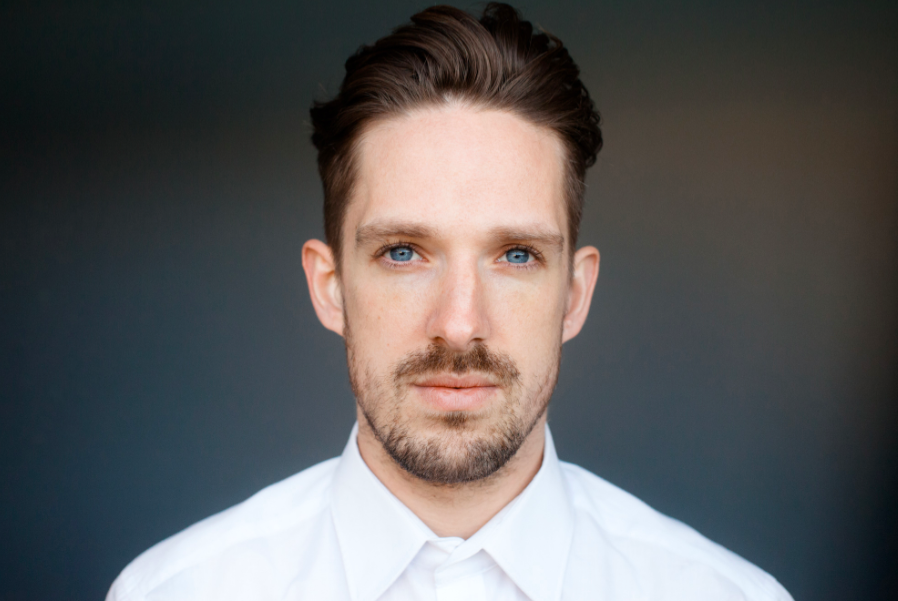
LN: When Israel was founded as a country, the Hebrew language was not as it is today. Modern Hebrew was, so to speak, created side by side with the country. Do people argue that you are using this deeply entrenched language to undermine many things that the country was founded upon?
HH: Well yes, it’s a very good question, you could look at it that way. The Hebrew that we use and work with, is obviously a language that has been created by Zionists. It’s the language that the settlers in Palestine dwelled upon, and that was to a larger extent shaped by German intellectuals who moved there and had this revolutionary idea.
LN: Which is insane in itself—bringing a group of people together, needing a language to unite them! It’s amazing that it worked.
HH: Yes it’s crazy. And it’s a very complex subject, but Hebrew is a very young language and it’s very poetic but also very practical. Then there are a lot of words and terms in the language that are really bound to the place, to “Israel the Holy Land.” Which is ironic because Zionism really was a secular movement. There are a lot of people who are trying to diversify this language and separate it from “ISRAEL” as the one true chosen place. This is a part of what we are talking about, yet I wouldn’t say that we have a one-way a political agenda, it’s not about creating a publication about a new language…
LN: No, but I think a lot of people would think that something so culturally strong is, by nature of itself, political.
HH: Clearly there is a certain political weight to any language. In Israel, people might easily think that we are trying to establish the anti-Zionist Hebrew voice and that we are going to try and disentangle the language from its place. That’s one aspect from which one could look at it, among many. In the end, we are trying to keep as neutral as possible and let all of the writers’ voices come through. There are a lot of diverse political voices in the magazine, and others that are more artistic, but the playfulness and the diversity of the texts shows the different points of views that you can look at this from. Not simply the political.
LN: Yes, languages don’t only encapsulate political points of views, but also reflect a variety of visual lexicons—which is also what you touch upon in Aviv.
HH: Right, and you always have expressions and colors and other things that you cannot exactly translate, that’s why in the magazine, there are always different images on the Hebrew and German sides, to show that there are different perspectives on everything. Like there is this Ayahuasca trip that Yael Bartana documented. She’s away with her friend in the forest on this journey, she shot a long movie about him taking Ayahuasca and him speaking about his experience. There is a whole part about language during his trip, he is thinking about Kabbalah, language and several other things. And on the German side we featured stills from the movie, whereas on the Hebrew side we featured his paintings made after the experience. And that’s the way it always works.
LN: Well that’s why it’s so interesting, because there are these multiple avenues that are at once the same but very different. Was there a reason then that you decided to create the magazine now? Do you feel like it’s a critical time in Germany or Israel?
HH: I felt like now was the time I wanted to do a print magazine. But in terms of the zeitgeist, I think the Hebrew-German dialogue is not 100% in line with this. Aviv is more of an art project. I think you can see that from the way the graphic design is built. It was designed for the pages to always be filled up, so that’s why we have different type sizes which was also a tool to translate the blocky-ness of the Hebrew typography.The written language is different, handwritten on a piece of paper it becomes more connected and more artistic. It was funny, the first font that our graphic designer chose was this very elongated biblical scripture-like font, and as a German, he thought it was very beautiful! When we looked at it, we had to immediately change it, we could absolutely not use that.
What is interesting is that, in the process, we figured out that, while it might sound banal, translation is something so fascinating. Regardless of the language, text is never the same text when you translate it, it always transports different colors, melodies and subtexts, and that’s what we want to shed light on with Aviv.
Lila Nazemian is a curator and writer, she also works at Leila Heller Gallery in New York. Recently she curated “Spheres of Influence,” the first exhibition of contemporary Arab art in Iran.